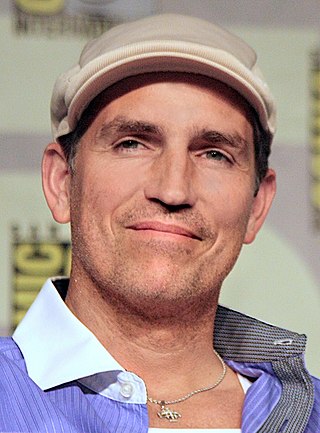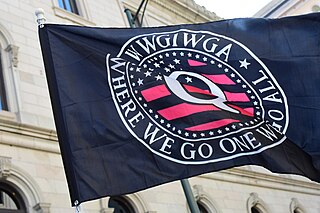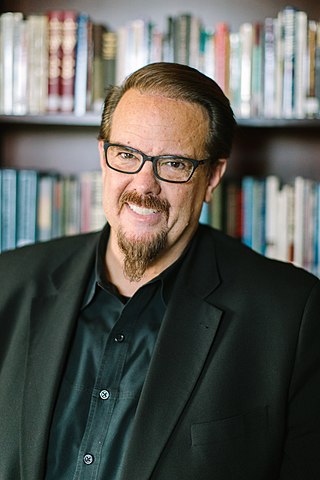Related Research Articles
The Christian countercult movement or the Christian anti-cult movement is a social movement among certain Protestant evangelical and fundamentalist and other Christian ministries and individual activists who oppose religious sects that they consider cults.
The Great Awakening was a series of religious revivals in American Christian history. Historians and theologians identify three, or sometimes four, waves of increased religious enthusiasm between the early 18th century and the late 20th century. Each of these "Great Awakenings" were characterized by widespread revivals led by evangelical Protestant ministers, a sharp increase of interest in religion, a profound sense of conviction and redemption on the part of those affected, an increase in evangelical church membership, and the formation of new religious movements and denominations.
The Christian right, otherwise referred to as the religious right, are Christian political factions characterized by their strong support of socially conservative and traditionalist policies. Christian conservatives seek to influence politics and public policy with their interpretation of the teachings of Christianity. In the United States, that means opposing any interpretation of the Establishment Clause of the U.S. Constitution that implies a "separation of church and state".
Christian fundamentalism, also known as fundamental Christianity or fundamentalist Christianity, is a religious movement emphasizing biblical literalism. In its modern form, it began in the late 19th and early 20th centuries among British and American Protestants as a reaction to theological liberalism and cultural modernism. Fundamentalists argued that 19th-century modernist theologians had misunderstood or rejected certain doctrines, especially biblical inerrancy, which they considered the fundamentals of the Christian faith.
Nondenominational Christianity consists of churches, and individual Christians, which typically distance themselves from the confessionalism or creedalism of other Christian communities by not formally aligning with a specific Christian denomination. According to Arizona Christian University's Cultural Research Center, nondenominational faith leaders typically maintain a biblical worldview at higher percentages than those of other Christian groups.

Carl Ferdinand Howard Henry was an American evangelical Christian theologian who provided intellectual and institutional leadership to the neo-evangelical movement in the mid-to-late 20th century. He was ordained in 1942 after graduating from Northern Baptist Theological Seminary and went on to teach and lecture at various schools and publish and edit many works surrounding the neo-evangelical movement. His early book, The Uneasy Conscience of Modern Fundamentalism (1947), was influential in calling evangelicals to differentiate themselves from separatist fundamentalism and claim a role in influencing the wider American culture. He was involved in the creation of numerous major evangelical organizations that contributed to his influence in Neo-evangelicalism and lasting legacy, including the National Association of Evangelicals, Fuller Theological Seminary, Evangelical Theological Society, Christianity Today magazine, and the Institute for Advanced Christian Studies. The Carl F. H. Henry Institute for Evangelical Engagement at Southern Baptist Theological Seminary and the Carl F. H. Henry Center for Theological Understanding at Trinity International University seek to carry on his legacy. His ideas about Neo-evangelism are still debated to this day and his legacy continues to inspire change in American social and political culture.

James Patrick Caviezel Jr. is an American actor. He played Jesus in The Passion of the Christ (2004) and The Passion of the Christ: Resurrection - Chapter I (2025), Tim Ballard in Sound of Freedom (2023), and starred as John Reese on the CBS series Person of Interest (2011–2016). He played Slov in G.I. Jane (1997), Private Witt in The Thin Red Line (1998), Detective John Sullivan in Frequency (2000), Catch in Angel Eyes (2001), and Edmond Dantès in The Count of Monte Cristo (2002).

QAnon is a far-right American political conspiracy theory and political movement that originated in 2017. QAnon centers on fabricated claims made by an anonymous individual or individuals known as "Q". Those claims have been relayed and developed by online communities and influencers. Their core belief is that a cabal of Satanic, cannibalistic child molesters is operating a global child sex trafficking ring that conspired against president Donald Trump. QAnon has direct roots in Pizzagate, an Internet conspiracy theory that appeared one year earlier, but also incorporates elements of many other theories. QAnon has been described as a cult.
Christian nationalism is a type of religious nationalism that is affiliated with Christianity. It primarily focuses on the internal politics of society, such as legislating civil and criminal laws that reflect their view of Christianity and the role of religion/s in political and social life.

John Wayne Todd, also known as "John Todd Collins", "Lance Collins", "Kris Sarayn Kollyns", and "Christopher Kollyns", was an American speaker and conspiracy theorist. He claimed to be a former occultist who was born into a 'witchcraft family' before converting to Christianity. He was a primary source for many Chick Publications works against Dungeons & Dragons, Catholicism, Neopaganism, and Christian rock.

In the United States, evangelicalism is a movement among Protestant Christians who believe in the necessity of being born again, emphasize the importance of evangelism, and affirm traditional Protestant teachings on the authority as well as the historicity of the Bible. Comprising nearly a quarter of the U.S. population, evangelicals are a diverse group drawn from a variety of denominational backgrounds, including Baptist, Mennonite, Methodist, Pentecostal, Plymouth Brethren, Quaker, Reformed and nondenominational churches.

Edward John Stetzer is an American author, pastor, and Christian missiologist. He is Dean and Professor of Leadership and Christian Ministry at Talbot School of Theology at Biola University. He also serves as Distinguished Visiting Scholar at Wycliffe Hall at Oxford University. Stetzer is Regional Director for Lausanne North America and editor-in-chief of Outreach. Stetzer has written for USA Today and CNN.

"Pizzagate" is a conspiracy theory that went viral during the 2016 United States presidential election cycle, falsely claiming that the New York City Police Department (NYPD) had discovered a pedophilia ring linked to members of the Democratic Party while searching through Anthony Weiner's emails. It has been extensively discredited by a wide range of organizations, including the Washington, D.C. police.
Charismatic Christianity is a form of Christianity that emphasizes the work of the Holy Spirit and spiritual gifts as an everyday part of a believer's life. It has a global presence in the Christian community. Practitioners are often called Charismatic Christians or Renewalists. Although there is considerable overlap, Charismatic Christianity is often categorized into three separate groups: Pentecostalism, the Charismatic movement, and the Neo-charismatic movement.
Conspiracy theories in United States politics are beliefs that a major political situation is the result of secretive collusion by powerful people striving to harm a rival group or undermine society in general.
TruNews is an American far-right fake news website and channel owned and hosted by Rick Wiles. TruNews frequently publishes conspiracy theories in addition to racist, anti-LGBT, antisemitic, and Islamophobic content. It has been designated a hate group by the Southern Poverty Law Center.

Pastel QAnon is a collection of techniques and strategies that use "soft" and feminine aesthetics – most notably pastel colors – that are used to attract women into the QAnon conspiracy theory, often using mainstream social media sites like Instagram, Facebook, Telegram and YouTube.
Lauren Elena Witzke is an American far-right political activist known for her anti-LGBT views and promotion of QAnon. Witzke was the Republican nominee in the 2020 United States Senate election in Delaware, which she lost to incumbent Democrat Chris Coons. She is a former TV show host for TruNews.
Will Sommer is an American journalist working as a media reporter for The Washington Post. Previously, he worked as a politics reporter for The Daily Beast since 2018, a campaign editor for The Hill and the Loose Lips columnist for the Washington City Paper. In his journalism, Sommer covers right-wing media, political radicalization and right-wing conspiracy theories in the United States.
References
- ↑ Fenster 1999, pp. 147–148.
- ↑ Wilcox 1988, pp. 663–664.
- ↑ Isikoff, Michael (October 10, 1992). "Opinion: THE ROBERTSON RIGHT AND THE GRANDEST CONSPIRACY". Washington Post . ISSN 0190-8286 . Retrieved April 13, 2024.
- ↑ Stewart, Katherine (October 26, 2012). "How Christian fundamentalism feeds the toxic partisanship of US politics". The Guardian . ISSN 0261-3077 . Retrieved April 13, 2024.
- ↑ Pettipiece, Timothy (March 21, 2021). "History repeats itself: From the New Testament to QAnon". The Conversation . Retrieved June 29, 2023.
- ↑ Miotto, Nicolò (2022). 'Stand against the wiles of the devil.': Interpreting QAnon as a Christian extremist movement (Thesis). Prague: Charles University. hdl:20.500.11956/178337.
- ↑ Jadarat, Mya (December 20, 2023). "Why would these Christians embrace conspiracy theories?". Deseret News . Retrieved April 13, 2024.
- ↑ Watson, Joey (December 22, 2020). "Conspiracy theories are taking hold in some churches. But some Christian leaders are fighting back". ABC News . Retrieved April 13, 2024.
- 1 2 Beaty, Katelyn (August 17, 2020). "QAnon: The alternative religion that's coming to your church". Religion News Service . Retrieved August 17, 2023.
- ↑ Lawrence, Joel (January 25, 2021). "Faith, Apocalypse, and Nationalism: Why Evangelicals Are Vulnerable to Conspiracy Theories". The Center for Pastor Theologians. Retrieved April 13, 2024.
- ↑ "Evangelical and Non-evangelical Voting & Views of Politics in America: Survey of 3,000 Americans" (PDF). Wheaton College Billy Graham Center . Retrieved April 13, 2024.
- ↑ Łowicki, Paweł; Marchlewska, Marta; Molenda, Zuzanna; Karakula, Adam; Szczepańska, Dagmara (March 1, 2022). "Does religion predict coronavirus conspiracy beliefs? Centrality of religiosity, religious fundamentalism, and COVID-19 conspiracy beliefs". Personality and Individual Differences . 187: 111413. doi:10.1016/j.paid.2021.111413. ISSN 0191-8869. PMC 8626275 . PMID 34866726.
- ↑ Kristian, Bonnie (August 26, 2020). "QAnon Is a Wolf in Wolf's Clothing". Christianity Today . Retrieved June 29, 2023.
- ↑ Stetzer, Ed (2017). "Christians, Repent (Yes, Repent) of Spreading Conspiracy Theories and Fake News—It's Bearing False Witness". The Exchange. Retrieved 17 August 2020.